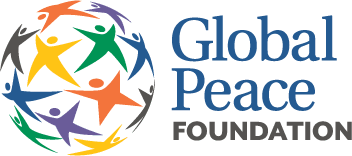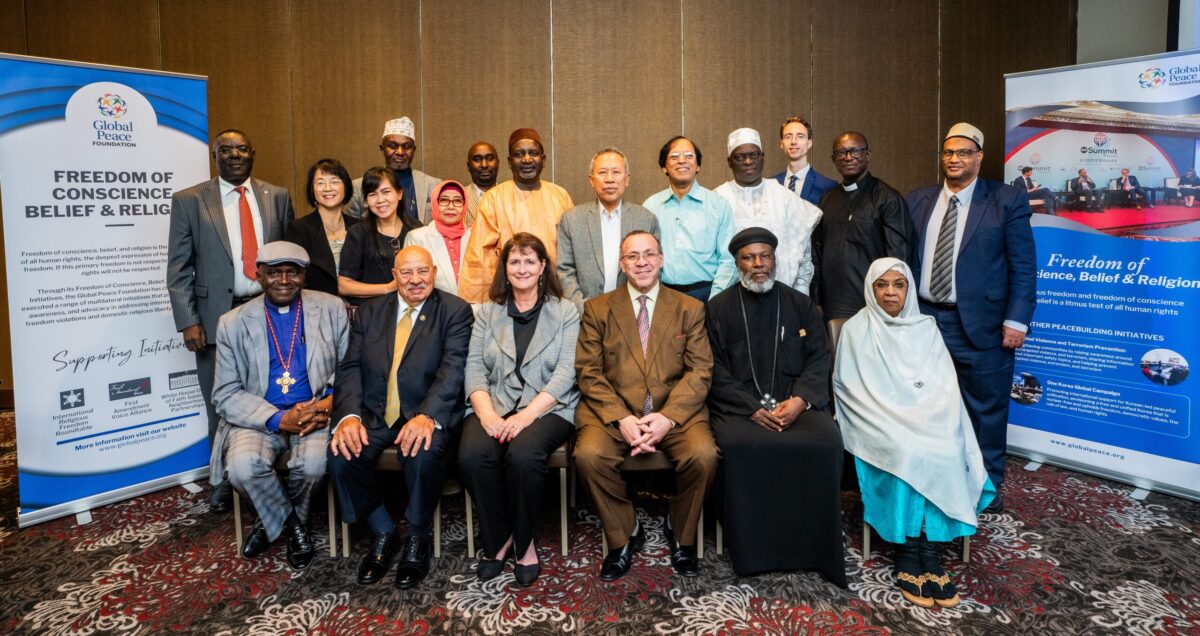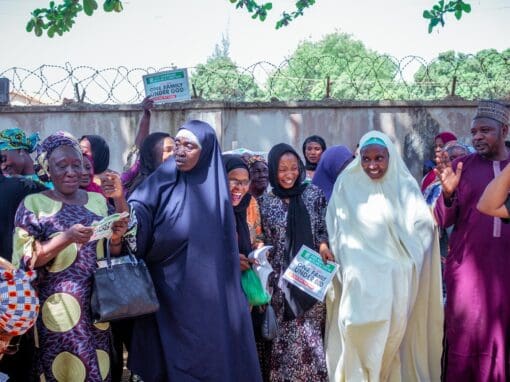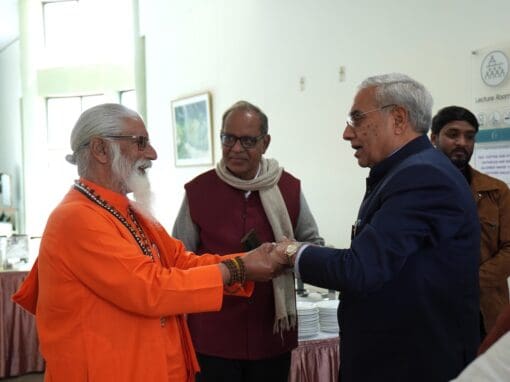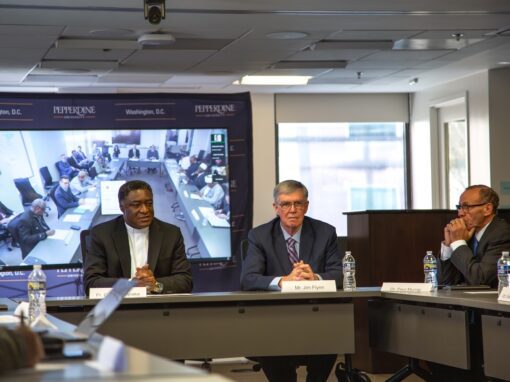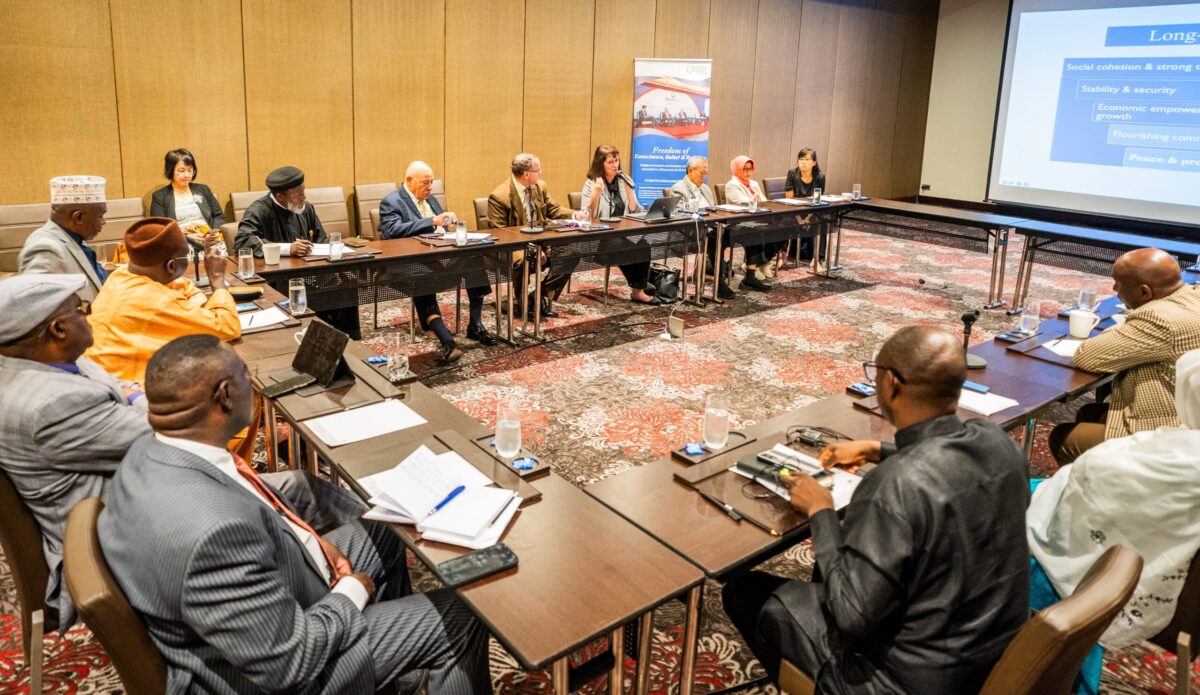
Hosted during the 2023 Global Peace Convention, the roundtable was modeled on the International Religious Freedom (IRF) Roundtable, comprised of representatives from non-governmental organizations who gather regularly to discuss religious freedom issues and propose joint advocacy actions for the protection and promotion of freedom of conscience, religion, and belief around the globe.
The roundtable was moderated by Dr. Paul Murray, the international vice president for Religious Freedom Initiatives at the Global Peace Foundation, and Nadine Maenza, president of the IRF Secretariat.
In his opening remarks, Dr. Murray emphasized the importance of exchanging effective strategies to protect freedom of conscience, religion and belief, and the difficulties encountered in creating and sustaining IRF Roundtables. “The roundtable should be established and directed locally by those on the ground because it is the conveners who are most knowledgeable of their respective norms and protocols,” Dr. Murray said. “They best know how to engage with leaders representing NGOs, government, and faith communities and what works best when engaging each other.”
U.S. Religious Freedom Day
January 16, 2024 marks the twenty-first annual National Religious Freedom Day in the United States, commemorating the adoption of Thomas Jefferson’s Virginia Statute for Religious Freedom on January 16, 1786. “On Religious Freedom Day, we renew our pledge to protect that right by ensuring each person of any faith or belief can live out the deepest convictions of their conscience with dignity and respect.” — Proclamation, U.S. President Joseph Biden , January 16, 2024 |
Participants from Uganda, Nigeria, Tanzania, India, Austria, Indonesia, the United Kingdom, and the United States underscored the global urgency of providing a safe place for people of all faiths and of none to come together.
Nadine Maenza provided a presentation on the needs and best practices of the International Religious Freedom Roundtable. “The IRF Roundtable is a proven platform for bringing people together—across deep political and theological differences—and building mutual understanding, respect, trust, and reliance among citizens, communities, and governments,” Ms. Maenza explained. “In fact, it is a model of good citizenship and governance that will contribute to the long-term security and economic interests of all countries and regions.”
Dr. Murray shared an example of effective collaboration, introducing the ongoing work of the Global Peace Foundation in Nigeria. The work has addressed extremist violence and identity-based conflict through the grass-roots engagement of Muslim and Christian faith leaders and traditional rulers.
Through its partnership with the IRF Roundtable, Dr. Murray said, GPF joined more than 70 international human rights and religious freedom organizations as co-conveners of the 2022 International Religious Freedom Summit held in Washington, DC. During this Summit, GPF led the initiative for a historic signing by Nigerian faith leaders. The “Declaration for a Peaceful and Secure Nigeria” condemned the use of violence and coercion to spread or hinder political or religious views and identities or to demean ethnic, regional, or tribal affiliations.
Nigerian Bishop Dr. Sunday Onuoha, founder and president of Vision Africa, shared his experience of attending the Washington IRF Roundtable virtually, emphasizing the value of such platforms in fostering dialogue. There are tangible outcomes when roundtable participants work together for the sake of all, he said.
“Doing multi-faith work as part of an IRF Roundtable is not about becoming more secular and abandoning our beliefs so we can work together, but rather bringing our whole selves, including our deepest held beliefs, respecting the dignity of each other while acknowledging those differences.” –Nadine Maenza
Roundtable participants shared their thoughts and the need to protect freedom of conscience, religion, and belief. A Ugandan participant highlighted the dangers of sects controlled by devious charismatic leaders, balancing safety with freedom. A Nigeria sheikh cited the Quran on the importance of religious tolerance and noted that disputes over land rights for minorities have contributed to social unrest. Panelists from India, Austria, and Kenya discussed the complexities and particular contexts that impact faith communities in those countries.
Representatives from Indonesia, the world’s largest Muslim-majority nation, underscored the importance of inclusive dialogue, while U.S. participants highlighted the fragile nature of religious freedom and how the issue is often into more significant geo-political and social conflicts.
In concluding remarks, Dr. Murray highlighted the significance of the roundtable, saying it symbolizes the strength of dialogue and the vital importance of mutual understanding in the intricate domain of religious liberty.
Each participant contributed ideas and voiced concerns equally and highlighted the pressing need to establish more such forums globally to bring to light religious oppression, restrictions, and conflict over religious expression. Through the free exchange of effective strategies and outcomes such forums can foster a worldwide community committed to peace and the right to live according to one’s conscience and beliefs.
Learn more about GPF’s work to Protect Freedom of Conscience, Religion, and Belief and register for virtual access to 2023 Global Peace Convention sessions.
